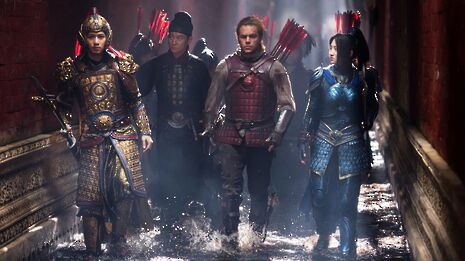Polem-Flick: In defence of The Great Wall
Zi Ran Shen asks whether Zhang Yi Mou’s latest epic is a victim of whitewashing or an attempt to educate Western audiences

The Great Wall, once known as a fortress that protected China from outside invaders, is now also a blockbuster Hollywood film. Despite criticism from inside and outside the wall, Zhang Yi Mou delivers entertainment worthy of the big screen. The plot is tried and true, the action exhilarating, and the cinematography grand. He has created a piece of cinema that sits comfortably in the Western market.
Criticisms about the flat plot and the casting of Matt Damon as the man who saves China, while valid, miss the point of the movie. To this humble reviewer, The Great Wall is not about breaking the mould, but rather fitting right in. In an age of increasing nationalism, Zhang Yi Mou reaches out to the West with a crash course in Chinese culture and the virtues of cooperation. Every aspect of the movie is drenched in rich history and culture – even the aliens. The Tao Tie (饕餮) are a beast permeating ancient mythology. They are gluttonous magical creatures rumoured to have an insatiable appetite, whose form appears regularly on ancient food-carrying pottery. Today, many Chinese foodies jokingly claim to be descendants from the Tao Tie as if they’ve inherited its voracity. Similarly, Zhang Yi Mou injects this movie with factual – though romanticised – accounts of China’s militaristic and geographic majesty. The military command structure was depicted accurately, as was the weaponry, the use of floating lanterns (shamelessly appropriated by Tangled, I might add), the palace of the emperor, all the way down to the prisoner’s method of restraint.
“Instead of the ‘white saviour’ critics claim William to be, he is simply a lens through which the audience could see the Western perception of China”
In speaking about the movie, Zhang Yi Mou described it as simply a vehicle to deliver an understanding of Chinese cultures and values. He emphasised responsibility and trust between directors and actors, key concepts which are echoed within the film. Though responsibility and trust are not values limited to the geographical constraints of China, their unique flavour within Chinese culture is sometimes difficult to decipher. Responsibility – although significant in Western cultures – is a defining Chinese value. Zhang Yi Mou has spoken about the pressure of responsibility he feels to both his audience and the actors after gaining fame. Similarly, Commander Lin of the Nameless Order feels the all-consuming responsibility to her country and her soldiers, who are willing to sacrifice themselves because they trust the commander. This kind of intense relationship puzzles William (Matt Damon) at first, but through increased exposure he begins to understand its necessity. This exposure is exactly what Zhang Yi Mou has created with The Great Wall.
The use of Matt Damon as the male lead is not about a white man saving China. His character’s interactions with the Chinese serve as an allegory for the relationships between the East and the West. In the beginning, neither William nor Commander Lin trust or respect each other. William was only there for black powder, while Commander Lin only wanted to know how William had killed the Tao Tie. Similar to how the Brits waltzed into China expecting a trade deal while disregarding the Emperor, and the brutal way in which the Emperor retaliated by killing the diplomat – neither side understood nor respected each other. In the film, William was able to earn the Nameless Order’s welcome through his aid. The Order, in turn, treated William as a valuable ally, thus finally forming a constructive relationship. Only through mutual aid were William and Commander Lin able to accomplish what they set out to do. Zhang Yi Mou’s message cannot be more clear – treat us with respect and we’ll honour you; treat us with disrespect and only calamity will come.
The Great Wall, despite its failings, serves a purpose – to introduce Chinese culture to the widest audience possible. Instead of the ‘white saviour’ critics claim William to be, he is simply a lens through which the audience could see the Western perception of China. In a moment of sharp commentary, William’s companion provokes him: “You think you’re a hero? You’re just a thief.” In the end, William’s newly learned humility did make him a hero, but only alongside Commander Lin
 News / Cambridge academics sign open letter criticising research funding changes22 February 2026
News / Cambridge academics sign open letter criticising research funding changes22 February 2026 News / Supporters protest potential vet school closure22 February 2026
News / Supporters protest potential vet school closure22 February 2026 News / University Council rescinds University Centre membership20 February 2026
News / University Council rescinds University Centre membership20 February 2026 News / Hundreds of Cambridge academics demand vote on fate of vet course20 February 2026
News / Hundreds of Cambridge academics demand vote on fate of vet course20 February 2026 Comment / A tongue-in-cheek petition for gowned exams at Cambridge 21 February 2026
Comment / A tongue-in-cheek petition for gowned exams at Cambridge 21 February 2026








